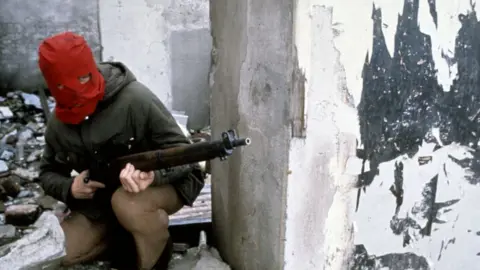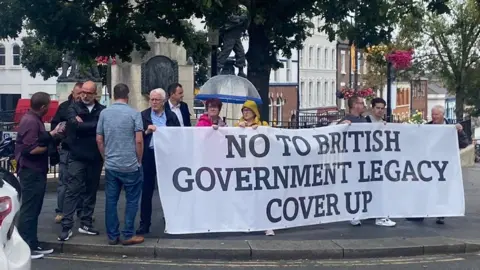NI Troubles: Human rights official wants legacy bill scrapped
 Getty Images
Getty ImagesA report by a top European human rights official has called on the government to consider withdrawing its controversial legacy bill.
The bill offers a conditional amnesty to those accused of killings and other Troubles-related crimes.
It said the bill should be stopped from its passage through parliament due to "widespread opposition".
The report stated there were fundamental questions about its compatibility with human rights laws.
It was written by Dunja Mijatović, human rights commissioner for the Council of Europe (CoE).
In previous criticism of the bill, she has said she believed it ran a very significant risk of being ruled unlawful by the courts.
The CoE is Europe's oldest oldest political body.
It aims to uphold human rights, democracy and the rule of law across the continent and is not part of the European Union.

What is the legacy bill?
- Legislation that aims to draw a line under the Northern Ireland Troubles by dealing with so-called legacy issues
- The Northern Ireland Troubles (Legacy and Reconciliation) Bill runs to almost 100 pages
- It was introduced in May in an attempt to deal with more than 1,000 unsolved killings
- A central element involves immunity from prosecution for those who co-operate with investigations run by a new information recovery body
- Victims' groups and political parties at Stormont are opposed to the bill, arguing it will remove access to justice for victims and their families
- Veterans Commissioner Danny Kinahan gave the bill a cautious welcome and it is also supported by the Northern Ireland Veterans Movement
- The Bill had its second reading in the Lords on 23 November. The government told peers it would bring forward amendments including "a more robust process" around immunity from prosecution
- Lord Caine of the Northern Ireland Office (NIO) said the Independent Commission for Reconciliation and Information Recovery (ICRIR) would be able to conduct criminal investigations
- The amendments will next be discussed at committee stage this month

Ms Mijatović stated a new approach, based on previously agreed "principles" in the 2014 Stormont House Agreement, "must be brought forward promptly to ensure that truth-finding and justice are no longer delayed."
In her report she stressed: "Any further steps on legacy must place the rights and needs of victims at its heart."

The Northern Ireland Office said the legislation did not introduce an amnesty and would not remove the prospect of criminal prosecution.
"Conditional immunity will only be granted to individuals who cooperate fully and truthfully with the commission," a spokesperson said.
"Individuals who do not will remain liable to prosecution and will be referred to prosecutors should sufficient evidence exist."
'International concern'
Northern Ireland-based human rights group, the Committee on the Administration of Justice, welcomed the report.
"This report from Europe's top human rights official adds to the chorus of international concern about the bill," said its deputy director Daniel Holder.
"The call on the UK to withdraw it is very welcome."
Amnesty International also backed the report.
Grainne Teggart, deputy director for Northern Ireland said the UK government had found itself isolated on the international stage.
"These are welcome and important calls which the UK government must not ignore. Victims' rights must be prioritised and the bill scrapped," she said.
